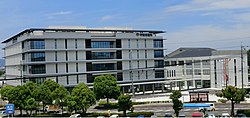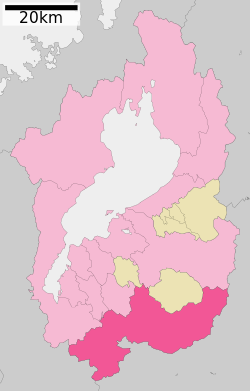City in Kansai, Japan
| Kōka 甲賀市 | |
|---|---|
| City | |
 Kōka City Hall Kōka City Hall | |
 Flag Flag Emblem Emblem | |
 Location of Kōka in Shiga Prefecture Location of Kōka in Shiga Prefecture | |
 | |
| Coordinates: 34°58′N 136°10′E / 34.967°N 136.167°E / 34.967; 136.167 | |
| Country | Japan |
| Region | Kansai |
| Prefecture | Shiga |
| Government | |
| • Mayor | Hiroki Iwanaga |
| Area | |
| • Total | 481.62 km (185.95 sq mi) |
| Population | |
| • Total | 89,619 |
| • Density | 190/km (480/sq mi) |
| Time zone | UTC+09:00 (JST) |
| City hall address | 6053, Minakuchi, Minakuchichō, Kōka-shi, Shiga-ken 528-8502 |
| Website | Official website |
| Symbols | |
| Bird | Common kingfisher |
| Flower | Sasayuri (Lilium japonicum) |
| Tree | Cryptomeria |


Kōka (甲賀市, Kōka-shi) is a city in southern Shiga Prefecture, Japan. As of 30 September 2021, the city had an estimated population of 89,619 in 36708 households and a population density of 190 persons per km². The total area of the city is 481.62 square kilometres (185.95 sq mi).
Geography
Kōka occupies the entire southern end of Shiga Prefecture, and is thus long east-to-west. At the eastern end of Kōka, the southern ridge of the Suzuka Mountains with one elevation of 1000 meters runs from northeast to southwest, forming the boundary with Mie Prefecture. The highest altitude point in Kōka is Mount Amagoi in this range.
Neighboring municipalities
Kyoto Prefecture
Mie Prefecture
Shiga Prefecture
Climate
Kōka has a Humid subtropical climate (Köppen Cfa) characterized by warm summers and cool winters with light to no snowfall. The average annual temperature in Kōka is 13.6 °C. The average annual rainfall is 1673 mm with September as the wettest month. The temperatures are highest on average in August, at around 25.4 °C, and lowest in January, at around 2.1 °C.
| Climate data for Shigaraki(elevation 265 m) | |||||||||||||
|---|---|---|---|---|---|---|---|---|---|---|---|---|---|
| Month | Jan | Feb | Mar | Apr | May | Jun | Jul | Aug | Sep | Oct | Nov | Dec | Year |
| Mean daily maximum °C (°F) | 6.5 (43.7) |
7.1 (44.8) |
11.0 (51.8) |
17.3 (63.1) |
21.8 (71.2) |
25.0 (77.0) |
28.8 (83.8) |
30.0 (86.0) |
26.0 (78.8) |
20.3 (68.5) |
14.9 (58.8) |
9.5 (49.1) |
18.2 (64.7) |
| Mean daily minimum °C (°F) | −3.5 (25.7) |
−3.4 (25.9) |
−1.1 (30.0) |
3.4 (38.1) |
9.1 (48.4) |
14.6 (58.3) |
19.1 (66.4) |
19.6 (67.3) |
15.9 (60.6) |
8.5 (47.3) |
2.4 (36.3) |
−1.9 (28.6) |
6.9 (44.4) |
| Average precipitation mm (inches) | 55.2 (2.17) |
70.7 (2.78) |
121.3 (4.78) |
111.5 (4.39) |
152.4 (6.00) |
207.6 (8.17) |
204.4 (8.05) |
143.7 (5.66) |
168.4 (6.63) |
120.1 (4.73) |
75.2 (2.96) |
53.6 (2.11) |
1,484.1 (58.43) |
| Average precipitation days (≥ 1.0 mm) | 9.1 | 10.1 | 13.1 | 10.9 | 11.2 | 13.0 | 12.8 | 9.3 | 11.4 | 9.8 | 8.3 | 8.2 | 127.2 |
| Mean monthly sunshine hours | 101.2 | 100.9 | 133.6 | 166.3 | 164.5 | 127.6 | 136.5 | 173.8 | 135.4 | 136.6 | 122.1 | 115.9 | 1,614.4 |
| Source: Japan Meteorological Agency | |||||||||||||
| Climate data for Tsuchiyama (elevation 248 m) | |||||||||||||
|---|---|---|---|---|---|---|---|---|---|---|---|---|---|
| Month | Jan | Feb | Mar | Apr | May | Jun | Jul | Aug | Sep | Oct | Nov | Dec | Year |
| Mean daily maximum °C (°F) | 6.3 (43.3) |
6.8 (44.2) |
10.7 (51.3) |
16.9 (62.4) |
21.2 (70.2) |
24.6 (76.3) |
28.5 (83.3) |
29.8 (85.6) |
25.9 (78.6) |
20.3 (68.5) |
14.8 (58.6) |
9.3 (48.7) |
17.9 (64.3) |
| Mean daily minimum °C (°F) | −1.9 (28.6) |
−1.8 (28.8) |
0.6 (33.1) |
5.6 (42.1) |
10.9 (51.6) |
15.9 (60.6) |
20.3 (68.5) |
21.3 (70.3) |
17.5 (63.5) |
10.6 (51.1) |
4.5 (40.1) |
−0.1 (31.8) |
8.6 (47.5) |
| Average precipitation mm (inches) | 60.0 (2.36) |
74.4 (2.93) |
113.8 (4.48) |
114.9 (4.52) |
159.0 (6.26) |
205.4 (8.09) |
212.1 (8.35) |
193.5 (7.62) |
208.8 (8.22) |
124.4 (4.90) |
80.6 (3.17) |
56.7 (2.23) |
1,603.6 (63.13) |
| Average precipitation days (≥ 1.0 mm) | 10.6 | 10.9 | 12.6 | 11.0 | 11.6 | 13.6 | 13.7 | 10.4 | 11.8 | 10.0 | 8.4 | 9.4 | 134 |
| Mean monthly sunshine hours | 90.9 | 98.2 | 137.0 | 167.1 | 165.8 | 128.3 | 139.4 | 177.2 | 132.7 | 140.2 | 125.0 | 108.9 | 1,610.7 |
| Source: Japan Meteorological Agency | |||||||||||||
Demographics
Per Japanese census data, the population of Kōka has recently plateaued after several decades of growth.
| Year | Pop. | ±% |
|---|---|---|
| 1920 | 59,455 | — |
| 1930 | 60,876 | +2.4% |
| 1940 | 61,133 | +0.4% |
| 1950 | 75,407 | +23.3% |
| 1960 | 70,755 | −6.2% |
| 1970 | 67,762 | −4.2% |
| 1980 | 75,203 | +11.0% |
| 1990 | 82,668 | +9.9% |
| 2000 | 92,482 | +11.9% |
| 2010 | 92,704 | +0.2% |
| 2020 | 88,358 | −4.7% |
History
Kōka is part of ancient Ōmi Province. During the Sengoku period, the area was an ikki and effectively self-governed by local ninja families. In the Edo period it became a center for the Kōga-ryū school of ninjutsu, in rivalry with Iga-ryū. The area was on the route of the Tōkaidō highway connecting Kyoto with Edo and the eastern provinces of Japan. Minakuchi-juku was both a post station and also a castle town for Minakuchi Domain, which ruled over parts of the area of Kōka during the Edo period. The village of Minakuchi was established on April 1, 1889 within Kōka District, Shiga with the creation of the modern municipalities system. It was raised to town status on August 18, 1894. On October 1, 2004, Minakuchi merged with the towns of Kōka, Kōnan, Shigaraki and Tsuchiyama (all from Kōka District) to form the city of Kōka.
Government
Kōka has a mayor-council form of government with a directly elected mayor and a unicameral city council of 24 members. Kōka contributes three members to the Shiga Prefectural Assembly. In terms of national politics, the city is part of Shiga 4th district of the lower house of the Diet of Japan.
Economy
Kōka is traditionally known for its production of ceramics, most notably Shigaraki ware, as well as agriculture and forestry. Light manufacturing is concentrated to pharmaceuticals.
Education
Kōka has 21 public elementary schools and six public middle schools operated by the city government and one middle school operated by the Shiga Prefectural Department of Education. The prefecture also operates four public high schools.
Transport

Railway
[REDACTED] JR West – Kusatsu Line
Shigaraki Kōgen Railway - Shigaraki Line
- Kibukawa - Shigarakigūshi - Kumoi - Chokushi - Gyokukeijimae - Shigaraki
Highway
Sister cities
 DeWitt, Michigan, United States, renewed 2005
DeWitt, Michigan, United States, renewed 2005 Marshall, Michigan, United States, renewed 2005
Marshall, Michigan, United States, renewed 2005 Traverse City, Michigan, United States, since 1969; renewed 2005
Traverse City, Michigan, United States, since 1969; renewed 2005
Local attractions
- Miho Museum
- Minakuchi Castle
- Minakuchi-juku
- Minakuchi Okayama Castle ruins
- site of Shigaraki Palace, National Historic Site
- Tarumi Saiō Tongū Site, National Historic Site
- Tsuchiyama-juku
Noted people
- Kaoruko Himeno, author
- Mineichi Iwanaga, politician
References
- "Kōka city official statistics" (in Japanese). Japan.
- Kōka climate data
- Kōka population statistics
- Ancient Warfare : Shinobi Ninjas and Kung Fu Shaolin Monks FULL DOCUMENTARIES. April 20, 2015 – via YouTube.
External links
- [REDACTED] Media related to Kōka, Shiga at Wikimedia Commons
 Koka travel guide from Wikivoyage
Koka travel guide from Wikivoyage- Kōka City official website (in Japanese)
- Kōka City official website (in English)
- Mapple Koka city -Secrets to Enjoying Kōka- Guide map of Kōka city
| Ōtsu (capital) | ||
| Core city | ||
| Cities | ||
| Districts | ||
| List of mergers in Shiga Prefecture | ||